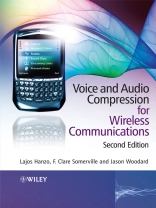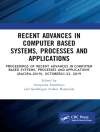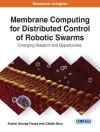Voice communications remains the most important facet of mobile
radio services, which may be delivered over conventional fixed
links, the Internet or wireless channels. This all-encompassing
volume reports on the entire 50-year history of voice compression,
on recent audio compression techniques and the protection as well
as transmission of these signals in hostile wireless propagation
environments.
Audio and Voice Compression for Wireless and Wireline
Communications, Second Edition is divided into four parts
with Part I covering the basics, while Part II outlines the design
of analysis-by-synthesis coding, including a 100-page chapter on
virtually all existing standardised speech codecs. The focus
of Part III is on wideband and audio coding as well as
transmission. Finally, Part IV concludes the book with a range of
very low rate encoding techniques, scanning a range of
research-oriented topics.
* Fully updated and revised second edition of ‘Voice
Compression and Communications’, expanded to cover Audio
features
* Includes two new chapters, on narrowband and wideband AMR
coding, and MPEG audio coding
* Addresses the new developments in the field of wideband speech
and audio compression
* Covers compression, error resilience and error correction
coding, as well as transmission aspects, including cutting-edge
turbo transceivers
* Presents both the historic and current view of speech
compression and communications.
Covering fundamental concepts in a non-mathematical way before
moving to detailed discussions of theoretical principles, future
concepts and solutions to various specific wireless voice
communication problems, this book will appeal to both advanced
readers and those with a background knowledge of signal processing
and communications.
İçerik tablosu
About the Authors.
Other Wiley and IEEE Press Books on Related Topics.
Preface and Motivation.
Acknowledgements.
I Speech Signals and Waveform Coding.
2 Predictive Coding.
3 Analysis-by-synthesis Principles.
4 Speech Spectral Quantization.
5 RPE Coding.
6 Forward-Adaptive CELP Coding.
7 Standard CELP Codecs.
8 Backward-Adaptive CELP Coding.
9 Wideband Speech Coding.
10 MPEG-4 Audio Compression and Transmission.
11 Overview of Low-rate Speech Coding.
12 Linear Predictive Vocoder.
13 Wavelets and Pitch Detection.
14 Zinc Function Excitation.
15 Mixed-Multiband Excitation.
16 Sinusoidal Transform Coding Below 4kbps.
17 Conclusions on Low Rate Coding.
18 Comparison of Speech Transceivers.
19 Voice Over the Internet Protocol.
A Constructing the Quadratic Spline Wavelets.
B Zinc Function Excitation.
C Probability Density Function for Amplitudes.
Bibliography.
Index.
Author Index.
Yazar hakkında
Lajos Hanzo has been with the Department of Electronics and
Computer Science, University of Southampton, UK, since 1986 where
he holds the Chair in Telecommunications. He received his degree in
electronics in 1976 and his doctorate in 1983. During his career in
telecommunications he has held various research and academic posts
in Hungary, Germany and the UK. Lajos is a Fellow of the IEEE and
the IEE as well as an IEEE Distinguished Lecturer. He has
co-authored 11 books on mobile radio communications, published over
500 research papers and been awarded a number of distinctions.
Clare Somerville received M.Eng and Ph.D degrees in
Electronic Engineering in 1995 and 1999, respectively, from the
University of Southampton. From 1995 to 1998 she performed research
into low bit rate speech coders for wireless communications.
Following a spell of research with the Global Wireless Systems
Research department, Bell Laboratories, Swindon, U.K, she moved to
Pico Chip in Bath, UK. Her current research involves real-time
services over wireless networks with a packet air interface.
Jason Woodard received an MA in Physics from the
University of Oxford in 1991, then an MSc in Electronics and a Ph D
in Speech Coding from the University of Southampton in 1992 and
1995 respectively. From 1995 to 1998 he worked as a Research Fellow
at the University of Southampton, researching error correction
coding, especially turbo codes. In 1998 he joined the Wireless
Technology Practice at PA Consulting Group in Cambridge. At the
start of 1999 he was transferred from PA to Ubi Netics Ltd, where he
is responsible for the development and implementation of bit rate
processing algorithms, including turbo codes, for 3rd Generation
mobile communications products.












